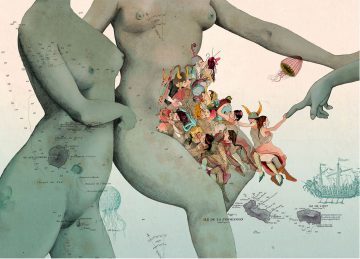Brigid Hains in aeon:
 We are shackled to the pangs and shocks of life, wrote Virginia Woolf in The Waves (1931), ‘as bodies to wild horses’. Or are we? Serge Faguet, a Russian-born tech entrepreneur and self-declared ‘extreme biohacker’, believes otherwise. He wants to tame the bucking steed of his own biochemistry via an elixir of drugs, implants, medical monitoring and behavioural ‘hacks’ that optimise his own biochemistry. In his personal quest to become one of the ‘immortal posthuman gods that cast off the limits of our biology, and spread across the Universe’, Faguet claims to have spent upwards of $250,000 so far – including hiring ‘fashion models to have sex with in order to save time on dating and focus on other priorities’.
We are shackled to the pangs and shocks of life, wrote Virginia Woolf in The Waves (1931), ‘as bodies to wild horses’. Or are we? Serge Faguet, a Russian-born tech entrepreneur and self-declared ‘extreme biohacker’, believes otherwise. He wants to tame the bucking steed of his own biochemistry via an elixir of drugs, implants, medical monitoring and behavioural ‘hacks’ that optimise his own biochemistry. In his personal quest to become one of the ‘immortal posthuman gods that cast off the limits of our biology, and spread across the Universe’, Faguet claims to have spent upwards of $250,000 so far – including hiring ‘fashion models to have sex with in order to save time on dating and focus on other priorities’.
It’s easy to roll our eyes at such outré displays of entitlement, seemingly endemic in the Silicon Valley set. Beyond Faguet, ‘transhumanist’ true believers awaiting their version of the rapture include the entrepreneur Elon Musk, the Googler Ray Kurzweil and the philosopher Nick Bostrom. Their transhumanist ideal resembles a late-capitalist rendering of Leonardo da Vinci’s Vitruvian man: an individual super-human, armed with a wealth of cognitive and physical enhancements, elevated to a state of unassailable strength and power, devoid of all dependency, and, often enough, endowed with the ability to reproduce without the inconvenience of women. As they describe it, ‘immortality’ sounds like nothing so much as manspreading into the future.
What’s most instructive about transhumanism, though, isn’t what it exposes about the hubris of rich white men. It’s the fact that it represents a paradigm case of what happens when a particular cast of mind, made from the sediment of centuries of philosophy, gets taken to its logical extreme. Since Plato, generations of philosophers have been gripped by a fear of the body and the desire to transcend it – a wish that works hand-in-hand with a fear of women, and a desire to control them. In the dialogue Timaeus, Plato likens the force of his ideal, immaterial forms to a disciplinarian father, imposing order on all this unwieldy material stuff that was nonetheless ‘the mother and receptacle of all created and visible and in any way sensible things’. Here Plato deploys a well-worn technique for suppressing corporeal angst: carving off the mind (rational, detached, inviolable, symbolically male) from the body (emotional, entangled, weak, symbolically female).
More here.
